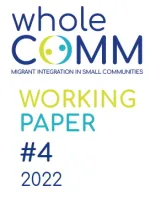Post-2014 migrants’ access to housing, employment and other crucial resources in small- and medium-sized towns and rural areas in Sweden

Working Paper No. 4 - Sweden
This report looks at post-2014 migrants’ access to housing, employment, and other relevant resources in different small and medium-sized towns and rural areas in Sweden. Primarily based on interviews conducted in six selected municipalities, it provides an overview of 1) the concrete barriers that post-2014 migrants are facing in relation to housing and employment; 2) the local actors who are involved in, and/or seen as responsible for, facilitating their access; 3) any concrete local measures or practices that help or hinder this access; and 4) the specific target groups of these measures, initiatives or practices. The report finds that in Sweden, migrants face many of the same barriers to housing and employment as the rest of the Swedish population, meaning high thresholds for labour market entry and a general shortage of rental housing. In the context of a universal welfare system, where the municipal sector in particular is both a large employer and a large residential property owner, migrants with residence permits can access the same general services as the population at large. While recently arrived migrants (i.e. those who have received their status within the last two years) are offered extra resources in the form of state-level labour market activation programmes and – in some cases – municipal housing quotas, the current reorganization of the public employment service (which has led to a shortage of state-level labour market resources) and the shortage of available housing, makes local policymakers and professionals question these services’ viability.